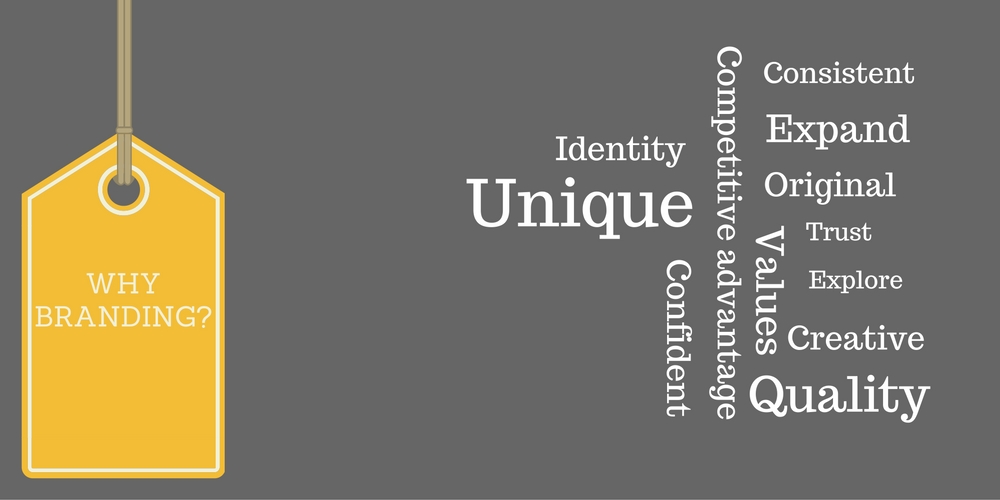
Many start-ups often overlook branding and dismiss this as only something that large corporations with big budgets do. Branding may seem irrelevant when you’re trying to meet day-to-day logistics or getting your product to the market in a short space of time. Yet, in a world where several homogeneous corporations exist, one of the most commonly overlooked sources of competitive advantage is brand.
Whether or not you are operating in a small niche market, every small business hopes to grow big one day, which is why branding cannot be overlooked.
Branding is not about creating a great logo and coming up with a catchy name, but simply the process of strengthening your brand that defines who you are, what you stand for and what you can offer to your audience – it is about how customers view you as a business.
So why is a brand powerful for small businesses?
Powerful brands attract and engage your target audience. They help you retain profit, they tell a brand story to your customers, differentiate you from competitors and generally make expanding your business a lot easier.
Think of it this way, if your competitors use unoriginal fonts, an incoherent colour theme and design, a small business that chooses a unique route to branding will stand out more for all the right reasons. As start-ups of the business, you need to realise how your target audience work and not how we would like them to be. Understanding your customers can lend to credibility and assurance to what they can expect when they buy from you.
There is a tendency in smaller companies to allocate as little as possible to branding – this is often a mistake since branding is one of the most powerful factor that can create a unique selling point.
Start-ups don’t have a huge amount to spend, however branding doesn’t have to be an expensive process. Here we go through some simple yet effective tips on branding for small businesses.
Define who you are
The first thing to do is to define who you are. Without a clear vision and identity it is easy to get lost in the process.
- What are your company’s value/mission?
- What do you want your brand to be known for?
- What is your USP?
- How do you want your customers to describe you?
- What perceptions do you want consumers to associate with your company?
By considering and answering these questions, this should give you a clearer idea of your values, vision and purpose. Once you have figured this out, write these down in a document so you can refer to this at a later date.
Originality
Start with the tangible elements of your business which is ultimately the logo and company name. A weak logo will almost be distorted in today’s overcrowded marketplace. If you want your brand to be heard and stand out use originality.
With new businesses, originality is the spark that creates audience awareness and allow customers to form a perception of your business. Be original in your logo, design and everything you do so that you establish your own brand and company identity.
Your logo should look professional and make people feel confident enough to buy from you. Consider how this is going to be designed as well as a good slogan that ties in well. However do remember that this has to resonate with your target audience, you must have your customers in mind since you are communicating directly to them.
David Dews, Managing Director at a creative marketing agency comments “The best way in to be original is to begin with your target audience, what do you know about them? What gives them value? Once you have gathered all the information, analyse your competitors and see how they position themselves in the market. Creativity goes with originality, without creative you can’t think of ideas outside the box or new ideas that helps you stand out against others in your industry”.
Originality doesn’t necessarily apply to the design side of the business, but also how you do things. For example, when doing your competitive analysis think of original ways you can do this better than your competitors. By having an original and strong brand; this differentiates you from competitors and can even protect you from other companies who are using low prices to draw in sales.
Consistency
Consistency is crucial to building a strong brand which customers can remember. You need to promote your brand by maintaining the same tone of voice throughout. Although it may be tempting to change a few colours and layout to your brand when creating a poster or an email, establishing a set of brand guidelines at an early stage ensures that everyone applies your brand identity consistently.
Reinforcing your brand guidelines will strengthen your message and drive customer loyalty, giving you a strong brand equity. Whether online or offline you should integrate your brand to every aspect of your company such as how you answer phone calls, email footers, business cards, and invoice/quotation templates etc. Your brand touchpoints need to promote your brand position.
In today’s competitive market, you can also consider partnering with an event staffing agency that can help you to stand out from the crowd and ensure that your brand makes a lasting impression. This kind of agency can provide a wide range of services, from event planning and marketing to on-site support and management. As a result, they can take care of all the details, leaving you free to focus on other aspects of your business.
DIY
If you do not have years of experience in graphic or design, then it may be best to hire a professional to develop your brand rather than do-it-yourself. They know the industry and they’ll make sure they take the time to understand yours. Branding is a critical long term investment and although it may cost you now, the end result will be worth it.
Deliver on your promise
Once a business has come up with a brand with a distinctive logo and tagline, they often forget about the brand promise. Strong and established brands deliver and provide great customer experience, therefore one of the most important things to do is ensure you stick to meeting your customers’ need and the values that you stand for.



